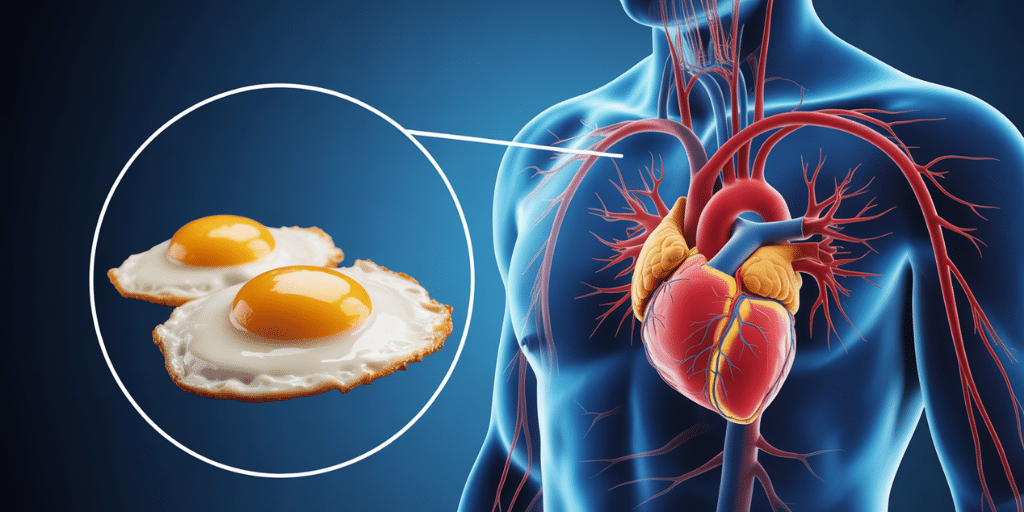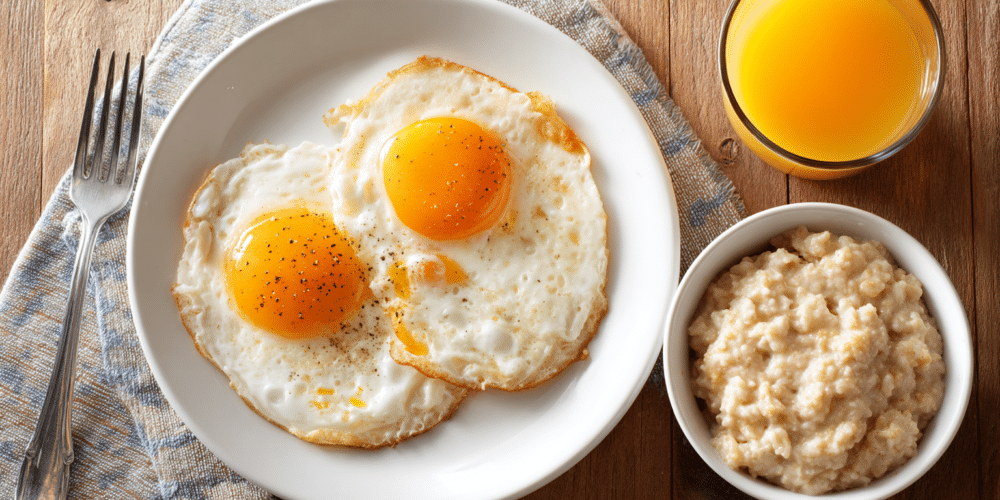
What if I told you that swapping your morning orange juice and oatmeal for a plate of eggs could actually be better for your heart? It sounds counterintuitive, doesn’t it? For decades, we’ve been warned that the cholesterol in eggs is a one-way ticket to heart disease. You’ve probably seen the labels, heard the advice, and maybe even opted for a sad, tasteless egg-white omelet, thinking you were doing your body a favor. The truth is, much of what we’ve been led to believe about eggs is based on outdated, flawed science from the 1950s. It’s time to crack open this myth and look at what modern research actually says.
For years, the humble egg has been unfairly villainized. Many people, and even some doctors, are still stuck in a 90s mindset, fearing that the cholesterol you eat directly translates to cholesterol clogging your arteries. This belief sparked one of the most damaging public health movements in history: the low-fat craze. As you’ll soon discover, this shift not only failed to solve the heart disease epidemic but may have made it worse by pushing us toward a diet high in sugar and processed carbohydrates. In this article, we’re going to take a deep dive into the journey of the egg’s reputation, uncover the scientific misunderstandings, and reveal why eggs are not the enemy of your heart. In fact, they might just be one of the healthiest foods you can put on your plate.
Key Takeaways
- Dietary cholesterol is not the villain: The cholesterol you eat in foods like eggs has a very small impact on the cholesterol levels in your blood.
- Your body makes its own cholesterol: Your liver produces about 80% of the cholesterol your body needs for essential functions like building cells and hormones.
- The fear of eggs is based on flawed science: Early studies from the 1950s that linked fat and cholesterol to heart disease were misleading and left out contradictory data.
- Sugar and inflammation are the real culprits: Modern science points to sugar, processed foods, trans fats, and chronic inflammation as the primary drivers of heart disease, not eggs.
- Eggs are nutrient-dense powerhouses: Far from being harmful, eggs are packed with vitamins, minerals, protein, and healthy fats that can actually reduce inflammation and support overall health.
- Modern blood tests are more accurate: Standard cholesterol tests are poor predictors of heart disease risk. More advanced markers like the Triglyceride-to-HDL ratio and C-reactive protein give a much clearer picture.
1. The Origin of the “Bad Egg” Myth

The fear of dietary cholesterol can be traced back to one of the most famous early nutrition studies: the “Seven Countries Study” by Ancel Keys in the 1950s. Keys published graphs that appeared to show a perfect, straight-line correlation: the more fat and cholesterol a country consumed, the higher its death rate from heart disease. The world was stunned. It seemed like science had finally found the answer to the growing heart disease crisis. Ancel Keys was on the cover of Time magazine, and the message was clear: fat and cholesterol are the enemy.
However, there were fundamental problems with this research. First, Keys selectively chose the countries that fit his hypothesis. He conveniently left out countries like France and Germany, where people ate a lot of fat but had low rates of heart disease. Including them would have completely dismantled his neat-and-tidy graph. Second, and more importantly, his study was associative. It only showed a correlation, not a cause. An association simply means two things are seen together, not that one causes the other. It’s like saying people who watch a lot of TV tend to have long toenails. It doesn’t mean TV causes toenail growth. To prove causation, you need rigorous clinical trials with control groups, which were never done to support this initial claim.
2. The Low-Fat Disaster of the 70s and 80s

Despite the shaky evidence, the anti-cholesterol message became dogma. In 1977, the American Heart Association and official U.S. dietary guidelines set a strict limit of 300 milligrams of cholesterol per day—less than what’s in two eggs. This recommendation was echoed by health organizations around the world, from the UK to Australia to Japan.
This sparked the low-fat movement. Suddenly, supermarket shelves were flooded with low-fat and fat-free products. People dutifully swapped their butter for margarine, their whole milk for skim, and their full-fat yogurt for sugary, fat-free versions. But here’s the catch: when you remove fat from food, you remove flavor. To make these products palatable, manufacturers loaded them with something else: sugar. As a result, the public began consuming massive amounts of sugar and refined carbohydrates, believing they were making a healthy choice. This turned out to be a disaster for our collective health, contributing to the very metabolic issues, like insulin resistance and inflammation, that we now know are at the core of heart disease.
3. The Truth About Cholesterol: Your Body’s Essential Building Block

So, what is this cholesterol molecule that has been so feared? Cholesterol is not a poison; it’s a waxy, fat-like substance that is absolutely essential to life. Every single cell in your body requires cholesterol to build its membrane, the protective outer layer that holds it together. Without it, you simply couldn’t exist.
Cholesterol is also the precursor to vital substances in your body, including steroid hormones like estrogen and testosterone, and vitamin D. It’s crucial for brain health, as it forms the protective myelin sheath that insulates your neurons, allowing them to communicate effectively. In fact, your brain is the most cholesterol-rich organ in your body. In rare genetic diseases where people cannot produce enough cholesterol, the consequences are severe, including developmental problems and cognitive impairment. Cholesterol is not something to be feared; it’s a critical, life-sustaining molecule.
4. Dietary vs. Blood Cholesterol: The Key Discovery

Here is the single most important discovery that turned the old thinking on its head: the cholesterol you eat has very little to do with the cholesterol in your blood. In the early 2000s, scientists finally understood that our liver is our body’s main cholesterol producer. Your liver manufactures about 80% of the cholesterol you need. Only about 20% comes from the food you eat, and even then, your body regulates it tightly. If you eat more cholesterol, your liver simply produces less. Most of the cholesterol you consume is simply excreted.
Even Ancel Keys, the man who started the anti-cholesterol movement, admitted this later in his life. In 1997, he was quoted as saying, “There’s no connection whatsoever between cholesterol in food and cholesterol in blood.” A major 2009 review study that looked at all existing research confirmed this, concluding that dietary cholesterol, especially from eggs, does not significantly impact blood cholesterol or increase cardiovascular risk for the vast majority of people.
5. The Science Catches Up: Why Guidelines Finally Changed
With the mountain of new evidence, the old guidelines became impossible to defend. In 2015, in a landmark decision, the U.S. Dietary Guidelines Advisory Committee officially removed the daily limit on dietary cholesterol. They stated that cholesterol is “not a nutrient of concern for overconsumption.” They shifted the focus to the real dietary culprits: added sugars and unhealthy trans fats. This was a massive, albeit quiet, reversal that acknowledged decades of robust science had finally disproven the old, flawed beliefs.
6. What Actually Causes Heart Disease? (Hint: It’s Not the Eggs)

If dietary cholesterol isn’t the problem, what is? The modern understanding of heart disease is more complex and points to two main factors: small, dense LDL particles and chronic inflammation.
It’s not the total amount of LDL (“bad”) cholesterol that matters as much as the size of the particles. Large, fluffy LDL particles are mostly harmless, but small, dense LDL particles are the ones that can easily penetrate the artery wall and cause plaque. What causes your liver to produce these dangerous small particles? High levels of sugar, fructose, and insulin.
The second factor is inflammation and oxidation. When those small LDL particles become oxidized (damaged by free radicals), they trigger an inflammatory response in your arteries, leading to the buildup of plaque. The biggest drivers of this inflammation and oxidation are high blood sugar spikes, processed vegetable oils, and trans fats (found in things like margarine and fried foods).
7. Your Breakfast Makeover: Why Eggs Beat Oatmeal for Heart Health

Now, let’s go back to that breakfast choice. A typical breakfast of oatmeal and orange juice is a massive load of carbohydrates that will spike your blood sugar and insulin. This, as we just learned, promotes the very conditions that lead to heart disease. Eggs, on the other hand, are primarily protein and fat, which have a minimal effect on blood sugar.
In fact, a fascinating study was conducted on individuals with diabetes. When they replaced their daily oatmeal breakfast with an egg breakfast, they saw a significant decrease in markers of inflammation in their bloodstream, without any negative impact on other heart disease risk factors. This shows that for your heart, eggs are a far superior choice to the sweet, starchy foods that many people start their day with.
8. Beyond “Total Cholesterol”: The Blood Tests You Should Be Asking For

For decades, doctors have relied on a standard lipid panel measuring “total cholesterol” and “LDL cholesterol” to assess heart risk. This is an outdated and often inaccurate approach. About 50% of people who have a heart attack have “normal” cholesterol levels. To get a true picture of your risk, you need to look deeper. Here are the tests you should discuss with your doctor:
- Triglyceride-to-HDL Ratio: This is a powerful predictor of insulin resistance and the presence of those dangerous small, dense LDL particles. Divide your triglycerides by your HDL (both in mg/dL). You want this ratio to be under 2, and ideally close to 1.
- C-reactive Protein (CRP): This is a direct measure of inflammation in your body. You want this number to be as low as possible, ideally under 1.
- ApoB (Apolipoprotein B): This test measures the total number of potentially plaque-forming particles in your blood. It’s a much more accurate predictor of risk than LDL cholesterol alone. Lower is better.
- HOMA-IR: This measures insulin resistance, a key driver of metabolic disease. It’s calculated from your fasting glucose and fasting insulin levels.
9. Putting Eggs Back on the Menu

Eggs are truly one of nature’s multivitamins. The yolk, which people used to throw away, is the most nutritious part. It’s packed with fat-soluble vitamins (A, D, E, K), minerals, and antioxidants. Eggs are also a fantastic source of choline, a nutrient crucial for brain health. While they are a good source of protein at about 6-7 grams per egg, you’d need to eat quite a few to meet your daily protein goals. Still, having three or four for breakfast is an excellent way to start your day with stable energy and a solid dose of nutrients.
Conclusion
The story of the egg is a powerful lesson in how scientific understanding evolves. We’ve moved from a place of fear, based on flawed and misinterpreted data, to a place of clarity. The evidence is now overwhelming: eggs are not bad for your heart. The fear of dietary cholesterol has led us down a dangerous path, causing us to ignore the real threats to our cardiovascular health—sugar, processed foods, and chronic inflammation.
So, you can stop being afraid of the humble egg. Enjoy them for breakfast, knowing you are providing your body with high-quality protein, healthy fats, and a wealth of essential nutrients. It’s time to put the myths to rest and embrace foods that truly nourish you from the inside out.
Source: Jessie Inchauspé

